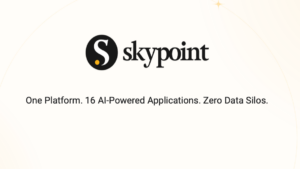The healthcare industry is in the midst of rapid digital transformation. With the adoption of various digital channels also comes the proliferation of provider and patient information. Managing this data is a major headache for healthcare organizations as they juggle multiple data sources, cloud-based platforms, and legacy systems. As a result, more organizations have adopted master data management (MDM) solutions to help manage their data.
Before starting Skypoint Cloud, I was the CTO at a major healthcare payer. In 2016, we recognized the need for an MDM platform and started weighing our options. But it quickly became clear this was not an easy solution to nail down.
Options from legacy vendors were overly complicated and costly, making it extremely difficult to modernize our data infrastructure.
But these challenges gave me an insider perspective on what healthcare organizations have to go through to extract real value from their data. This began to plant a seed that revealed where the biggest opportunities in healthcare innovation lie.
Let’s start from the beginning to understand these challenges. We’ll review:
- Why MDM is important.
- How Master Data Management works.
- Why healthcare organizations struggle with MDM framework implementation.
- How MDM as a Service helps providers and patients take control of their data.
Why is MDM Crucial for Healthcare Organizations?
MDM uses technology to manage business data, often from multiple sources, to achieve the following goals for an organization’s master data set:
- Uniformity
- Accuracy
- Accountability
- Governance
- Integrity
- Semantic Consistency
For healthcare organizations, effective operations and care delivery comes down to the ability of various business units to access unified data, the foundation of interoperability, and analytics. Interoperability allows different systems and software applications to work together, while analytics supports timely and accurate data-driven decision-making.
Additionally, MDM software connects master data with standardized information (i.e. healthcare terminology) through reference data management. The process helps users contextualize data correctly in downstream applications to create a consistent view of products, services, providers, and patients.
Without this foundation, organizations risk downstream systems operating on different or inaccurate data, and processes could become fraught with errors.
How MDM Solves Healthcare Data Challenges
MDM helps solve leading healthcare data challenges, including:
Data Ingestion
Healthcare data comes from several sources in various formats. It’s increasingly challenging to centralize and normalize all this data.
Data Reconciliation
Siloed systems create a fragmented data landscape that makes it difficult, if not impossible, to generate reports and gain enterprise-wide data insights.
The Total Cost of Ownership
Building and maintaining a data lake to collect and organize data from multiple sources is costly and requires specialized expertise.
Data Scalability
Data stuck in legacy systems is notoriously hard to activate at scale, impeding business processes and stifling innovation.
360-Degree View
“Dirty data” or incomplete data makes it hard to derive holistic insights about patients, which is essential for value-based care organizations.
Data Security and Compliance
Compliance with data privacy regulations (i.e. HIPAA) is an uphill battle without a complete picture of your data infrastructure.
Issues With A Lot of MDM Solutions Out There
My experience in implementing an MDM solution for a healthcare organization gave me an in-the-trenches perspective on how challenging master data management can be.
Here are the two main issues organizations face with current MDM solutions on the market:
Rule-Based Processes
Most current MDM solutions are rule-based. The rules accumulate over time and become hard to manage.
The complexity and potential conflicts can cause processes to break down and errors to occur—preventing organizations from achieving accuracy, speed, and efficiency in data management.
Implementation and Maintenance
An MDM solution is only as good as your team’s ability to set it up and use it properly.
However, many MDM solutions have restrictive implementation and integration requirements (i.e. you need to overhaul your whole tech stack). In addition to this headache, most don’t provide the support to help your team get the most out of the lofty investment you made.
A New Approach to MDM: MDM as a Service
MDM as a Service combines master data management software with professional services to ensure that you have the tools to manage your data infrastructure and access to the skills and knowledge you need to maximize your ROI.
Our MDM as a Service has two layers. First is a labeling model where the software consolidates data from different sources. Next, we leverage AI and machine learning to create a consistent view of each record.
For example, consider that a provider obtained a patient’s phone numbers from several sources. It must organize and reconcile the information (i.e. mobile phone, work phone, etc.) to create a golden record. The process requires many checkpoints to clean up the data and organize the information while ensuring accuracy and consistency.
Skypoint Cloud eliminates the complexity of rule-based operations by using artificial intelligence (AI) and machine learning capabilities to determine which data elements are compatible. Our platform stitches information and matches data from various sources to create a unified, 360-degree view.
Additionally, our software supports headless implementation. You can integrate it with your existing data stack as a backend service or use it as a platform (i.e. a CRM system) to process your data.
No matter how you implement your MDM solution, we help you achieve the most critical objective of MDM—creating a set of master data and achieving data unification. We make it possible to bring all your data sources into a singular, easy-to-access location. We make it possible to create and maintain a strong healthcare data culture.
Who Benefits From MDM as a Service?
The SaaS approach to MDM helps healthcare organizations lower data management costs significantly as they scale their operations. Fewer resources are needed to manage and track data. Meanwhile, teams consume data faster and more reliably as our software stitches together information from multiple sources in real-time.
Payers, providers, and life sciences companies benefit from our MDM as a Service. In particular, value-based care organizations where various providers use different systems and applications without a consistent model to connect the data experience the most positive impact
https://www.youtube.com/watch?v=lmclGOjDX54
With our end-to-end service, you don’t have to cobble together various, potentially uncooperative solutions. Instead, you avoid the costly, time-consuming, and error-prone processes of reconciling patient information, building reference data, and connecting these data elements to create a consistent, 360-degree patient record.
How Skypoint Supports Your Healthcare Organization
Our MDM as a Service allows you to outsource master data management of critical information. We empower you to focus your resources on your core competencies while managing your data effectively to support real-time reporting and data-driven decision-making.
The high degree of automation improves operational efficiency while eliminating human error. You can tap into economies of scale to lower data management costs in the long run.
Moreover, the hybrid model combines software with managed services to help you bridge skill or availability gaps in your team to implement and maintain the solution cost-effectively. Find out how our end-to-end MDM solution unifies data across your ecosystem to create golden records at scale.




